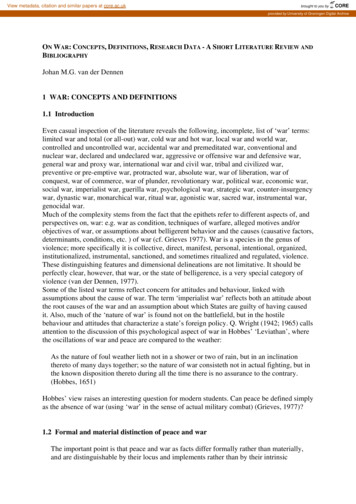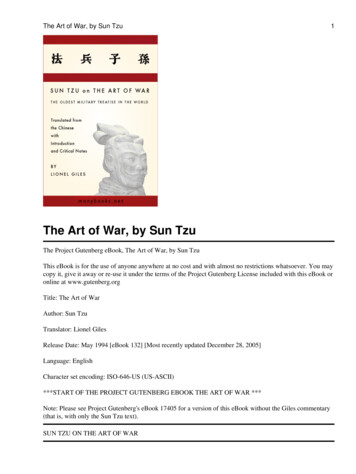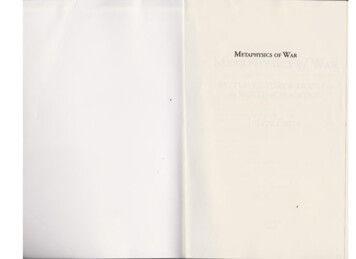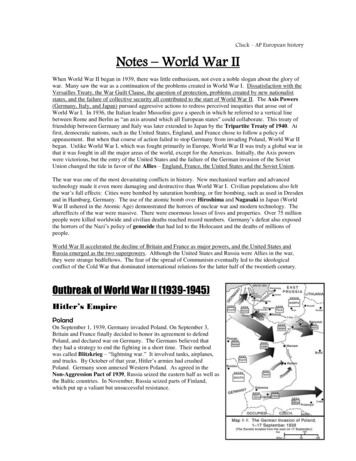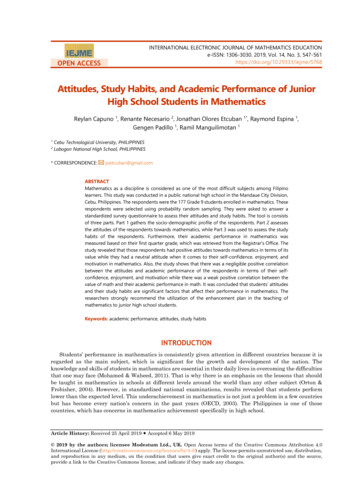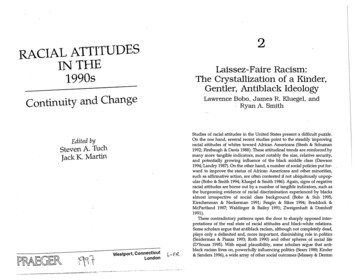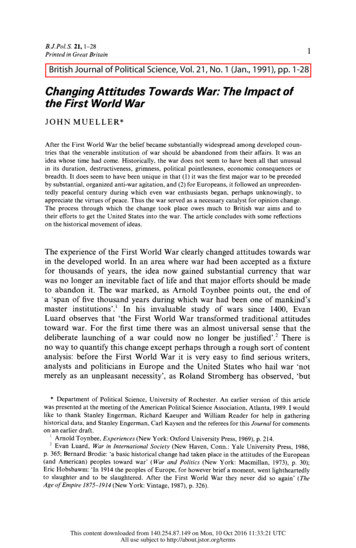
Transcription
B.J.Pol.S.B.J.Pol.S.21,21,1-281-28Printed in Great BritainBritish Journal of Political Science, Vol. 21, No. 1 (Jan., 1991), pp. 1-28Changing Attitudes Towards War: The Impact ofthe First World WarJOHN MUELLER*After the First World War the belief became substantially widespread amontries that the venerable institution of war should be abandoned from their affairs. It was anidea whose time had come. Historically, the war does not seem to have been all that unusualin its duration, destructiveness, grimness, political pointlessness, economic consequences orbreadth. It does seem to have been unique in that (1) it was the first major war to be precededby substantial, organized anti-war agitation, and (2) for Europeans, it followed an unprecedentedly peaceful century during which even war enthusiasts began, perhaps unknowingly, toappreciate the virtues of peace. Thus the war served as a necessary catalyst for opinion change.The process through which the change took place owes much to British war aims and totheir efforts to get the United States into the war. The article concludes with some reflectionson the historical movement of ideas.The experience of the First World War clearly changed attitudes towards warin the developed world. In an area where war had been accepted as a fixturefor thousands of years, the idea now gained substantial currency that warwas no longer an inevitable fact of life and that major efforts should be madeto abandon it. The war marked, as Arnold Toynbee points out, the end ofa 'span of five thousand years during which war had been one of mankind'smaster institutions'.1 In his invaluable study of wars since 1400, EvanLuard observes that 'the First World War transformed traditional attitudestoward war. For the first time there was an almost universal sense that thedeliberate launching of a war could now no longer be justified'.2 There isno way to quantify this change except perhaps through a rough sort of contentanalysis: before the First World War it is very easy to find serious writers,analysts and politicians in Europe and the United States who hail war 'notmerely as an unpleasant necessity', as Roland Stromberg has observed, 'but* Department of Political Science, University of Rochester. An earlier version of this articlewas presented at the meeting of the American Political Science Association, Atlanta, 1989. I wouldlike to thank Stanley Engerman, Richard Kaeuper and William Reader for help in gatheringhistorical data, and Stanley Engerman, Carl Kaysen and the referees for this Journal for commentson an earlier draft.'Arnold Toynbee, Experiences (New York: Oxford University Press, 1969), p. 214.2 Evan Luard, War in International Society (New Haven, Conn.: Yale University Press, 1986,p. 365; Bernard Brodie: 'a basic historical change had taken place in the attitudes of the European(and American) peoples toward war' (War and Politics (New York: Macmillan, 1973), p. 30);Eric Hobsbawm: 'In 1914 the peoples of Europe, for however brief a moment, went lightheartedlyto slaughter and to be slaughtered. After the First World War they never did so again' (TheAge of Empire 1875-1914 (New York: Vintage, 1987), p. 326).This content downloaded from 140.254.87.149 on Mon, 10 Oct 2016 11:33:21 UTCAll use subject to http://about.jstor.org/terms
2 MUELLERasasspiritualspiritualsalvation salvationand hope of regeneration'.3and hopeAfterofthe regeneration'.3war such become extremelybecomerare.extremely rare.Obviously,Obviously,this changethisof attitudechangewas notofenoughattitudeto preventwasthe cataclysmnot enouofof1939-451939-45or the manyor smallerthe manywars that havesmallertaken placewarssince 1918.thatBut havethetheexistenceexistenceof these warsofshouldthesenot bewarsallowedshouldto cloud an notappreciationbe allowofofthetheshift shiftof opinionofthatopinionwas caused bythatthe FirstwasWorldcausedWar. The notionby the Fthatthatthe institutionthe institutionof war, particularlyof warwar,in theparticularlydeveloped world, waswarrepul-in thesive,sive,uncivilized,uncivilized,immoral and immoralfutile - voiced onlyandby futileminorities beforevoiced1914onl--waswasan ideaanwhoseideatimewhosehad come.4timeIt is onehadthat hascome.4permeatedItmostis oneofofthethedevelopeddevelopedworld ever since,worldand it haseverprobablysince,been anandimportantit has prelementelementin the remarkablyin the remarkablylong peace that has envelopedlong peacethe developedthatworldhas ensincesince1945.51945.5TheThefirstfirstsection ofsectionthis articleofinvestigatesthis articlewhy the FirstinvestigatesWorld War hadwhsuchsuchan impactan impacton war attitudes,on warand the attitudes,second assesses theandprocesstheor mechasecond assnismnismthroughthroughwhich this whichremarkable thischange tookremarkableplace.6change took pTheThefinalfinalsection exploressectionsomeexploresgeneral considerations.some RobertgeneralDahl hasconsidobserved that:because of their concern with rigor and their dissatisfaction with the 'softness' of histori-cal description, generalization, and explanation, most social scientists have turned away3 Roland N. Stromberg, Redemption by War. The Intellectuals and 1914 (Lawrence: RegentsPress of Kansas, 1982), pp. 1-2.4 The widespread acceptance of the notion that war had become unthinkable aided Adolf Hitler,history's supreme atavist, in his astoundingly single-minded quest to bring about another warin Europe. After the First World War most people paid Hitler the undue compliment of assumingthat, no matter how belligerent his actions and demands, he could not seriously contemplatedoing anything that might plunge the world into another cataclysmic war. Throughout the 1930sHitler, a liar of truly monumental proportions, assiduously played on this perception. In virtuallyevery speech he assured everyone - foreigners as well as the war-fearing German people - thathis needs and demands were eminently limited and satisfiable, and that his fear and loathingof war was all-consuming. His arguments on this issue were agile and multifaceted. He proclaimedwar to be 'infinite madness' (1933), a 'disaster' (1936), and 'an evil' (1938). Amplifying, he arguedthat it was intolerably costly ('no possible profits could justify the sacrifices and sufferings thatwar entails' - 1935), foolishly diverting, beneficial only to Communism and potentially annihilative('I do not believe that Europe can survive such a catastrophe' - 1935). He also used his FirstWorld War experience to support his argument ('these years make me in the depths of my beingwishful for peace, since I recognize the frightful horrors of war' - 1939). Incredibly, he evenused his racism to show his peaceful intentions: 'Our racial theory therefore regards every warfor the subjection and domination of an alien people as a proceeding which sooner or later changesand weakens the victor internally, and eventually brings about his defeat . National SocialistGermany wants peace because of its fundamental convictions' - 1935 (The Speeches of AdolfHitler, April 1922-August 1939 (London: Oxford University Press, 1942), pp. 1046, 1348, 1513,1198, 1231, 1669, 1218-20.)5 For the development of this argument, see John Mueller, Retreat from Doomsday. The Obsoles-cence of Major War (New York: Basic Books, 1989); for a comparison of nuclear weapons andchanging attitudes towards war as determinants of the long peace, see John Mueller, 'The EssentialIrrelevance of Nuclear Weapons: Stability in the Postwar World', International Security, 13 (Fall1988), pp. 55-79.6 This portion of the article is a further and far more fully developed discussion of some considerations presented in Mueller, Retreat from Doomsday, pp. 55-6.This content downloaded from 140.254.87.149 on Mon, 10 Oct 2016 11:33:21 UTCAll use subject to http://about.jstor.org/terms
Changing Attitudes Towards War tof ideas. As a ofresult,ideas.theirAsowna theories,result,howevertheir'rigorous'own theories, howtheytheymaymaybe, leavebe, outleavean importantout an explanatoryimportantvariableexplanatoryand often leadvariableto naive reducand often ies,applies,I believe, toI believe,much socialtosciencemuchliteraturesocialonsciencewar. Switzerliterature onlandlandandandotherothercountriescountrieshave avoidedhavewar foravoidedcenturies,warandforthis experiencecenturies, and thstronglystronglysuggestssuggeststhat warthatis notwarsomehowis notrequiredsomehowby humanrequirednature or byby humanthethecascadingcascadingforcesforcesof history.ofRather,history.war atRather,base is merelywara atsocialbaseinventionis merely a socthatthatpeoplepeoplehave resortedhave resortedto from timeto tofromtime.7 timeIf theytochangetime.7their Ifideasthey chanaboutaboutits itsvaluevalueand desirabilityand desirability- as happened-atasthehappenedtime of the Firstat theWorldtime of thWarWar- this- thiscan havecansubstantialhave substantialconsequences. consequences.Since beliefs and ideasSinceare often,beliefs and ideasasasDahlDahlnotes,notes,'a major'a independentmajor independentvariable', to ignorevariable',changes intoattitudeignore timportantout of consideration.8out of consideration.8AsAsDahlDahlsuggests,suggests,there maytherebe somethingmay beof somethingan inherent andofratheran inherentunpleaand ratsantsantmushinessmushinessin the studyin theof thestudy'historicalof themovement'historicalof ideas',movementand analysis of ideas',willwilltendtendto betoinductivebe inductiveand after-the-fact,and after-the-fact,rather than predictive.rather(Or, tothanput predictiveititanotheranotherway, way,anyone anyonewho came whoup withcamea goodupmethodwithforapredictinggood methodideasfor prwhosewhosetimetimehad comehadwouldcomebe wouldlikely to bekeeplikelyit secrettobecausekeeptheitmethod,secret becauseappliedappliedto stockto stockmarketsmarketsand commodityand production,commoditywouldproduction,quickly make thewould quictheoristtheoristthe therichestrichestperson inpersonthe world.)inButtheit doesworld.)not seemButwiseit indoesthis not seemareaareato toignoreignorephenomenaphenomenathat cannotthateasily cannotbe cisionprecisionor probedor probedwith deductivewith panache.deductiveSome preliminarypanache. reflectionsSome preliminaryonrthe historical movement of ideas conclude the article.THE UNIQUENESS OF THE FIRST WORLD WARWhat made the First World War so special in its impact on attiwar?This section investigates four possibilities. The first is the mthe war was unique in its sheer destructiveness. On evaluation,in broader historical perspective, it seems that the First Worldall that unusual in its duration, destructiveness, grimness, politicaleconomic consequences or breadth. In two important and somrespects, however, the war does seem to have been quite uniqthe first major war in history to have been preceded by substantiaanti-war agitation; and (2) it followed a century that was mosEuropean history, one in which the continent had managed, perfully appreciating it, to savour the relative blessings of substan7 On this issue, see Margaret Mead, 'War Is Only an Invention - Not a Bioloin Leon Bramson and George W. Goethals, eds, War (New York: Basic Books, 1and John Mueller, 'War as an Institution: Natural, but Not Necessary', in Red., The Institution of War (London: Macmillan, forthcoming).8 Robert A. Dahl, Polyarchy. Participation and Opposition (New Haven, Conn.:Press, 1971), pp. 182-3, 188.This content downloaded from 140.254.87.149 on Mon, 10 Oct 2016 11:33:21 UTCAll use subject to http://about.jstor.org/terms
4 MUELLERpeace.peace.Finally,Finally,the First WorldtheWar wasFirstunique inWorldthat it wasWarthe firstwastouniqueraiseraisethe spectrethethatspectrethe science ofthatwarfarethehad advancedscienceso far thatof thewarfarenexthad adsuchsuchwar couldwarbringcouldworld annihilation;bring however,worldit seemsannihilation;that this beliefhowevwaswasprobablyprobablyless a cause oflesschangedaattitudescausetowardsof warchangedthan a consequenceattitudes towofofthosethosechanges. changes.TheTheDestructivenessDestructivenessof the First World Warof the First World WarNormanNormanRich arguesRichthat thearguesFirst WorldthatWar, 'to thea far greaterFirstextent'WorldthanWar, 'tearlierearlierwars, wars,nourishednourishedsome of thesomeworst qualitiesof theof the humanworstcharacter.qualitiesFor four yearsofmenthe humanwereweresystematicallysystematicallytrained in the use oftrainedviolence, for fourin yearsthehatreduseandofslaughterviolence, for fwerewereextolledextolledas the highestashumanthevirtues,highestfor four yearshumanmen were exposedvirtues,to sufferingfor four yearsandanddeath,death,their sensibilitiestheirbluntedsensibilitiesto the pain and sufferingbluntedof others.toThe thebrutalizingpain and sufeffecteffectof war ofwas a warcommonwasexperiencea commonto the populationexperienceof all belligerent powers,to the populandandit leftititsleftmark onitsthemmarkall.9on them all.9InInnonenoneof these ofrespectsthesewas the respectsFirst World WarwasremotelytheunusualFirsteither World Wininkindkindor degree.orIt is,degree.in fact, difficultIt is,to imaginein fact,a war that difficultcould not beto imacondemnedcondemnedfor its systematicfor violence,its systematicintense hatred, suffering,violence,death and intense hblunted sensibilities.The Great War, as it was known for two decades, was extremely costlyof course: casualties were enormous, and they were intense, suffered over whatcould be considered to be a rather short period of time. But in broader historicalperspective, the destructiveness of the war does not seem to be all that unique.To begin with, it was not the first war of that magnitude. The Taiping rebel-lion, a civil war that raged through China between 1851 and 1864, probablycaused a greater loss of life in absolute terms: over 30 million against lessthan 20 million in the First World War.10If one looks at the costs of previous wars in relative terms, the uniquenessof the First World War is even less obvious. There were about 430 millionpeople in Europe in 1914." Of these a high estimate is that some 17,860,00Europeans died in the war - 11,867,000 of the military forces, 5,993,000 civiliansThis high estimate of the death rate would suggest that about 4.1 per cen9 Norman Rich, Hitler's War Aims: Ideology, the Nazi State, and the Course of Expansion (NewYork: Norton, 1973), p. xxx.'0 Taiping: Ho Ping-ti, Studies on the Population of China, 1368-1953 (Cambridge, Mass.: Harvard University Press, 1959), p. 275; First World War: Ruth Leger Sivard, World Military aSocial Expenditures 1987/88 (Washington, DC: World Priorities, 1987), pp. 29-31 (all Sivard estmates are based on data gathered by William Eckhardt). Sivard estimates the Taiping total deathsat 2,000,000, a figure that is almost inconceivably low: see pp. 236-47 in Ho's book." Colin McEvedy and Richard Jones, Atlas of World Population History (New York: Penguin1978), p. 19.This content downloaded from 140.254.87.149 on Mon, 10 Oct 2016 11:33:21 UTCAll use subject to http://about.jstor.org/terms
Changing Attitudes Towards War 5of the European population perished in the war.12 A war in which one intwenty-five dies is calamitous, but there had been hundreds, probably thousands, of wars previously in which far higher casualty rates were suffered.For example, the destruction of Carthage by Rome in 146 BC was essentiallytotal. Indeed, in ancient times it was not uncommon for victors to 'consecrate'city-states to the gods by killing every person and animal in them and bydestroying all property.'3 If the Bible is to be taken as literal truth, the Israeliteslaunched a series of such wars. God was reportedly concerned that the currentoccupants of the promised land might subvert the Israelites by teaching themthe 'abominations which they have done unto their gods', thus causing theIsraelites to sin. Accordingly it was required that they kill the heretics beforesuch damage could come about (Deuteronomy 20: 16-18), and the book ofJoshua relates the consequent utter annihilation of the peoples of Jericho, Ai,Libnah, Lachisk, Eglon, Hebron, Debir, Hazor and the areas in between (thepeople of Gibeon, however, cut a deal and were merely enslaved).History is filled with examples of such slaughter. According to Thucydides,when the Athenians invaded the island of Melos in 416 BC, they 'put to deathall the grown men whom they took and sold the women and children forslaves, and subsequently sent out five hundred colonists and inhabited theplace for themselves'. Josephus' classic account of the Jewish War that endedin AD 79 catalogues massacre, pestilence, human sacrifice, famine, cannibalismand the slaughter of prisoners, resulting in the death of hundreds of thousands,perhaps millions.14 When Genghis Khan's hordes moved into Russia in thethirteenth century, whole towns 'vanished' - they were smashed, burned downand depopulated. In Riazan, the captured men, women and children were killedwith swords or arrows, thrown into fires or bound, cut and disembowelled.'5When Constantinople fell to the Crusaders in 1204, the victors were soon12 This high estimate takes the war death figures as detailed in Sivard (World Military andSocial Expenditures 1987/88, pp. 29-31) for the European combatants - that is, it excludes thedeaths suffered in the war by Australia (60,000), Canada (55,000), India (50,000), New Zealand(16,000), Turkey (1,450,000), and the United States (126,000). If these non-European peoples wereincluded in the calculations, the proportion killed in the war would be lower because their populations would dramatically inflate the percentage base. McEvedy and Jones estimate that a totalof 8 million military deaths were suffered in the war (Atlas of World Population History, p. 34),substantially lower than Sivard's 12,599,000. A careful and widely accepted 1923 estimate of totalmilitary deaths is also lower: between 10 and 11 million (Samuel Dumas and K. O. Vedel-Petersen,Losses of Life Caused by War (London: Oxford University Press, 1923), p. 144). Others estimatetotal battle deaths at 9 million: J. M. Winter, The Experience of World War I (New York: OxfordUniversity Press, 1989), p. 206; Melvin Small and J. David Singer, Resort to Arms: Internationaland Civil Wars, 1816-1980 (Beverly Hills, Calif.: Sage, 1982), p. 89. Another estimate is 7,734,300:Jack S. Levy, War in the Modern Great Power System, 1495-1975 (Lexington: University Pressof Kentucky, 1983), p. 91.13 G. Johannes Botterweck and Helmer Ringgren, Theological Dictionary of the Old Testament(Grand Rapids, Michigan: Eerdmans, 1986), pp. 189-98.14 Thucydides, The Peloponnesian War (New York: Modern Library, 1934), p. 337; GaalyaCornfeld, ed., Josephus. The Jewish War (Grand Rapids, Michigan: Zondervan, 1982), pp. 450-1.15 Peter Brent, Genghis Khan (New York: McGraw-Hill, 1976), pp. 117, 120.This content downloaded from 140.254.87.149 on Mon, 10 Oct 2016 11:33:21 UTCAll use subject to http://about.jstor.org/terms
6 MUELLER'transformed'transformedinto a mob drivenintoby hate,a mobgreed, anddrivenlust', as DonaldbyQuellerhate, greed,putsputsit, andit,sankandinto a frenzysankof pillage,intorapea andfrenzymassacre, andofthen,pillage,inrapefiftyfiftyyears d the citysystematicallyof its treasures, reducinglooted the cit to ruins.'6Most appropriately, perhaps, the First World War should be compared toearlier continent-wide wars fought in Europe, such as the Thirty Years Warof 1618-48, the Seven Years War of 1756-63 and the Napoleonic Wars thatended in 1815. In proportionate, and sometimes in absolute, terms these warswere often at least as costly as the First World War for individual belligerentcountries. According to Frederick the Great, Prussia lost one-ninth of its population in the Seven Years War,17 a proportion higher than almost any sufferedby any combatant in the wars of the twentieth century.'8 And Germany'spopulation dropped by about 20 per cent in the Thirty Years War.'9 Usinga high estimate for the death rate for the First World War and a low onefor that of the Napoleonic Wars, it seems that, proportionately, about threetimes as many people died in the later war as in the earlier one - a substantialdifference, perhaps, but not clearly a revolutionary one. Using a low estimatefor deaths in the First World War and a high one for deaths in the NapoleonicWars, the death rates for the two wars are about equal.20 Winners lost heavilyin the First World War, but some of the worst losses of the Napoleonic Warswere also suffered by a winner, Russia. And the expression 'Pyrrhic victory'stems from a battle fought in 279 BC.Not only were there many massive, hideously destructive, wars before theFirst World War, but there was a substantial belief that many of the warshad been even more horrible than they actually were. Often - in fact, typically- war stories would substantially exaggerate the extent of the destruction andbloodshed. It seems unlikely that the utter annihilation of all those cities inCanaan as detailed in the book of Joshua actually took place, but when theauthors of the Bible got around to writing the story a few centuries later16 Donald E. Queller, The Fourth Crusade: The Conquest of Constantinople 1201-1204 (Philadelphia: University of Pennsylvania Press, 1977), pp. 149-53.17 Luard, War in International Society, p. 51.18 Small and Singer, Resort to Arms, pp. 82-99.19 Geoffrey Parker, The Thirty Years War (London: Routledge and Kegan Paul, 1984), p. 211.20 Sivard estimates 2,380,000 military and civilian deaths in the Napoleonic Wars (World Militaryand Social Expenditures 1987/88, p. 29) when Europe had a population of 180,000,000 (McEvedyand Jones, Atlas of World Population History, p. 18), and this generates a death rate of 1-3 percent as against 4-1 for the First World War. However, authoritative estimates of deaths in theNapoleonic Wars by nineteenth-century historians (more relevant for present purposes since thesewould inform the perspectives of their contemporaries) were often much higher. For example,Sivard estimates total military deaths to have been 1,380,000, but most historians held that theFrench alone suffered between 1,700,000 and 3,000,000 deaths; and even those who discountedthat estimate argued that total military deaths in the wars were 'less than 2,000,000' (Dumasand Vedel-Petersen, Losses of Life Caused by War, p. 28). Levy's estimate of battle deaths inthe war, 1,869,000, is substantially higher than Sivard's (War in the Modern Great Power System,p. 90). For the First World War estimates, see fn. 12 above.This content downloaded from 140.254.87.149 on Mon, 10 Oct 2016 11:33:21 UTCAll use subject to http://about.jstor.org/terms
Changing Attitudes Towards War tthatannihilationannihilationmade formadea goodforyarn.a goodSimilaryarn. Similarexaggerationsexaggerations- some- someof themof themquitequitespectacularspectacular- characterize- characterizemuch othermuchwritother writinging ononwar.war.ForForcenturiescenturiesa legenda legendprevailedprevailedholdingholdingthat Germanythat Germanyhad sufferedhad sufferedaa 7575 perpercentcentdeclinedeclinein populationin populationduringduringthe Thirtythe ThirtyYears War.21YearsYetWar.21commonYet erbroughtbroughtaboutabouta widespreada widespreadrevulsionrevulsionwith war withaswar asanan sdemandsthat it be that it ontinuedto betoacceptedbe acceptedas a normalas a normalway of doingway of doingthings.22Nor was the First World War special in the economic devastation it caused.Indeed, within a few years after the war, most of the combatant nations hadsubstantially recovered economically: by 1929 the German economy was fullyback to prewar levels, while the French economy had surpassed prewar levelsby 38 per cent and the American economy by 70 per cent.23 By contrast,many earlier European wars had been fought to the point of total economicexhaustion. Richard Kaeuper's study of the economic effects of decades ofwar in the late middle ages catalogues the destruction of property, the collapseof banks, the severing of trade and normal commerce, and depopulation ofentire areas, the loss of cultivated land, the decline of production, the reductionof incomes, the disruption of coinage and credit, the hoarding of gold andthe assessment (with attendant corruption) of confiscatory war taxes.24 TheThirty Years War set back the German economy by decades and the SevenYears War brought Austria to virtual bankruptcy.25 Because of war, arguesBertrand Russell, 'North Africa has never regained the level of prosperity itenjoyed under the Romans'.26 The 'most meaningful question', observes AlanMilward, 'is whether the cost of war has absorbed an increasing proportionof the increasing Gross National Product of the combatants. As an economic2' The legend is reported in C. V. Wedgwood, The Thirty Years War (London: Jonathan Cape,1938), p. 516.22 One partial caveat might be made to this argument about the loss of life in war. The moralnotion about the 'sanctity of life' (as opposed to the sanctity of the soul) seems to be a fairlynew one, apparently arising in the course of the nineteenth century. If human life becomes moregreatly treasured, the costs of war effectively rise as a consequence of such a change in perspectiveor values.23 R. J. Overy, The Nazi Economic Recovery 1932-1938 (London: Macmillan, 1982), p. 16.24 Richard W. Kaeuper, War, Justice, and Public Order: England and France in the Later MiddleAges (New York: Oxford University Press, 1988), pp. 77-117.25 During the Thirty Years War - when almost two-thirds of the expenditures of the city ofNordlingen were devoted to direct military demands - the average wealth declined precipitously.The city gradually recovered during the next twenty years, but then another cycle of wars leftit 'helpless to solve its own financial problems'. It took fifty years to recover (and then onlywith outside intervention) at which point it was plunged once again into deep debt by the warsof the French Revolution. See Christopher R. Friedrichs, Urban Society in an Age of War (Princeton,NJ: Princeton University Press, 1979), pp. 154, 169.26 Bertrand Russell, The Impact of Science on Society (New York: Simon and Schuster, 1953),p. 74.This content downloaded from 140.254.87.149 on Mon, 10 Oct 2016 11:33:21 UTCAll use subject to http://about.jstor.org/terms
8 MUELLERchoicechoicewar, war,measuredmeasuredthis way, has notthisshownway,any discernablehas notlong-termshowntrendany ess'.27TheTheFirstFirstWorld WorldWar toppledWarpoliticaltoppledregimes in politicalGermany, t it was hardlybut newit wasin this hardlyrespect. Andnewto suggestin thisthatrthetheFirstFirstWorld WorldWar was newWarin thewasannalsnewof warfarein thein its annalstragic futilityof sswould be absurd -wouldby most reasonablebe absurdstandards- byhugehugenumbersnumbersof costly previousof costlywars wouldpreviousrival, and warsoften surpass,wouldit onrivathosethosedimensions.dimensions.For example,Forthe Trojanexample,War stemmedthefromTrojanthe abductionWar stfromfromGreeceGreeceof the beautifulof theHelen.beautifulThe point of Helen.the war receivesThe thepointfollowingof thanalysisanalysisby a soldierby ainsoldierShakespeare'sinTroilusShakespeare'sand Cressida:Troilus and CForForeveryeveryfalse dropfalsein herdropbawdy inveins,her bawdy veins,AAGrecian'sGrecian'slife hathlifesunk; hathfor everysunk;scruple for every scrupleOfOfherhercontaminatedcontaminatedcarrion weight,carrion weight,AATrojanTrojanhath beenhathslain.beenSince sheslain.could speak,Since she could speakSheShehathhathnot givennotso manygivengoodsowordsmanybreath good words breathAsAsforforher Greeksher andGreeksTrojans sufferedand Trojansdeath.suffered death.It is true that the First World War was soon viewed as a tremendous waste- enormous sacrifice for little gain. But the war could have been accepted asa noble necessity. After all, the war did appear to crush German expansionismand militarism, and initially at least it established a new order dominated bythe victors - rather along the lines of the costly wars against Napoleon a centuryearlier. The revulsion and disillusion did not emerge because this massive warwas peculiarly pointless but because people were ready to evaluate war usingnew standards.In some respects the First World War could be seen to be an improvementover many earlier wars. Civilian loss, in the West at least, was proportionatelyquite low, while earlier wars had often witnessed the destruction of entire cities.Modern instances would include Magdeburg in 1631, Moscow in 1812 andAtlanta in 1864.28 Moreover, logistics were vastly improved in the First WorldWar so that, unlike in olden days, soldiers did not have routinely to forageamong the civilian population for food, sexual release and shelter. Nor waspillage and booty-seeking, a commonplace in many wars, the standard in the27 Alan S. Milward, War, Economy and Society, 1939-1945 (Berkeley: University of CaliforniaPress, 1977), p. 3.2X Because of this phenomenon the First World War was somewhat more notably destructivecompared to earlier continent-wide wars if one deals only with battle deaths. Levy calculatesbattle deaths as a percentage of the entire population of the continent and concludes that theFirst World War was 3.6 times more destructive
respects, however, the war does seem to have been quite unique: (1) it was. the first major war in history to have been preceded by substantial, organized, anti-war agitation; and (2) it followed a century that was most peculiar in European history, one in which the continent had managed, perhaps without

